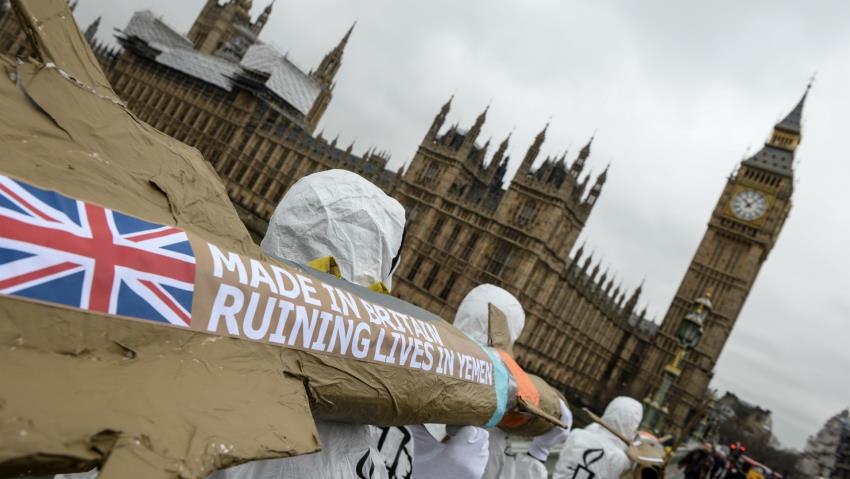Alwaght- An arms sales watchdog blamed the UK government over its failure to disclose intelligence that could save the lives of thousands of people involved in ongoing global conflicts.
The Balkan Investigative Reporting Network (Birn) highlighted the dangers of the “diversion” of arms and ammunition legally supplied to Saudi Arabia but then passed on to third-party “proxy fighters” including terror groups, and said the practice was fuelling conflicts, The Guardian reported.
The warning comes at a time when the UK is attempting to expand the multibillion pound arms trade with the Persian Gulf kingdom, which leading a three-year aggression against neighboring Yemen.
The Yemeni Ministry of Human Rights announced in a statement on March 25 that the Saudi-led war had left 600,000 civilians dead and injured since March 2015.
The Labour MP Lloyd Russell-Moyle told the Observer “At best the UK government is turning a blind eye to arms exports to Islamist groups in Syria; at worst it is complicit in these transfers. Despite the government’s boiler-plate comments that it is robust, something is very badly wrong with Britain’s arms control regime.”
The allegation relates to applications for standard individual trade control licenses submitted to the Department for International Trade (DIT) in 2014 by two unnamed UK arms brokers. The applications sought government approval for the brokers to act as intermediaries in an arms deal involving 30m rounds of ammunition – including 13,492,927 AK-47 bullets and 3,063,276 rounds of sniper ammunition – to be supplied by arms manufacturers in Bosnia to the Saudi government, which was listed as the “end user”.
According to the report, suspicions surrounding the consignment arose as a result of establishing that the Saudi army does not use AK-47 assault rifles, and therefore the 13m bullets that formed part of the consignment were likely to be diverted to proxy fighters engaged in the Yemen conflict.
At the same time, the Bosnian government received an arms export license application for the same consignment, which it began processing.
The DIT, which normally processes applications within 20 days, considered the applications under the EU and national arms export licensing criteria, which allows for applications to be rejected if they relate to the supply of armaments to countries under embargos or sanctions or where it is believed that the “end user” will divert the weapons to terrorists or criminals in countries such as Yemen or South Sudan.
In this case the UK government took 14 months to investigate before deciding to reject the applications, citing the reason for refusal as “a determination that the stated end user was not the intended recipient” and that there was “an unacceptable risk that the items would be diverted within the buyer country or re-exported under undesirable conditions”.
The Bosnian government was not told of the DIT’s suspicions and approved the export license, allowing the ammunition to reach Saudi Arabia in two parts in November 2015 and January 2016.
Freedom of information requests submitted to DIT by Birn questioned why the UK government failed to notify the Bosnian government of its suspicions and refusal of the brokering licenses. The FoI response stated: “Bosnia-Herzegovina is not party to the European Union mechanism of denial notifications. Consequently, there is no established mechanism through which the Export Control Organization could have informed the Bosnian authorities.”
While this statement is true in part, such mechanisms do exist under the arms trade treaty, which came into force in 2014, to which both the UK and Bosnia are signatories. The treaty obliges member states to monitor arms exports and ensure that weapons do not cross existing arms embargos or end up being used for human rights abuses including terrorism, the purpose being to limit the flow of weapons that fuel conflicts in places such as Syria, Yemen and South Sudan.
Bosnian officials have since confirmed that the UK failed to disclose its concerns and refusal, which they indicated would have caused them to refuse the export license and prevented the diversion.
Since the launch of Saudi aggression on Yemen in 27 March 2015, the UK has completed more than £3.3bn in arms sales to Saudi Arabia. The FoI response confirmed that this was the only refusal of a brokers’ license by the UK government in the last 10 years relating to arms destined for the Saudi regime.
Russell-Moyle strongly criticized the government during an arms export controls committee meeting last week, suggesting the DIT could have phoned Bosnian officials. “Was it not that simple?” he asked.
The international trade minister Graham Stuart said: “I know we did not contact the Bosnians … and the goods were shipped before we turned down the license applications.”
Russell-Moyle asked why, having previously been warned by US and EU authorities that the 30m rounds of ammunition were likely to be diverted, the department had “miss[ed] the chance to stop the ammunition from getting into the hands of Isis and other Islamist groups”.
Russell-Moyle quoted two further failures, in 2013 and 2014, reported by Birn, in which licenses were approved in for armaments that were subject to diversion despite the government being warned in advance.



























